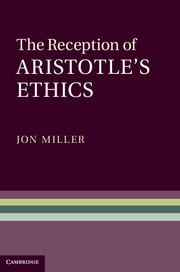
-
Select format
-
- Publisher:
- Cambridge University Press
- Publication date:
- February 2013
- December 2012
- ISBN:
- 9780511979873
- 9780521513883
- 9781107540934
- Dimensions:
- (228 x 152 mm)
- Weight & Pages:
- 0.6kg, 319 Pages
- Dimensions:
- (229 x 152 mm)
- Weight & Pages:
- 0.46kg, 322 Pages
You may already have access via personal or institutional login
Book description
Aristotle's ethics are the most important in the history of Western philosophy, but little has been said about the reception of his ethics by his many successors. The present volume offers thirteen newly commissioned essays covering figures and periods from the ancient world, starting with the impact of the ethics on Hellenistic philosophy, taking in medieval, Jewish and Islamic reception and extending as far as Kant and the twentieth century. Each essay focuses on a single philosopher, school of philosophers, or philosophical era. The accounts examine and compare Aristotle's views and those of his heirs and also offer a reception history of the ethics, dealing with matters such as the availability and circulation of Aristotle's texts during the periods in question. The resulting volume will be a valuable source of information and arguments for anyone working in the history of ethics.
Reviews
'As this engaging volume makes clear, different periods in the history of the reception of Aristotle’s ethical theorizing have unsurprisingly drawn different morals from his teachings, as they were made available from the Nicomachean Ethics and other sources. As the authors of this fascinating volume attest, by comparing our own approaches and preoccupations to those of earlier encounters with Aristotle’s ethical writings, we stand to learn a great [deal] about our own philosophical practices and preferences - and, of course, about Aristotelian ethical theory itself.'
Christopher Shields - University of Oxford
Contents
Metrics
Altmetric attention score
Full text views
Full text views help Loading metrics...
Loading metrics...
* Views captured on Cambridge Core between #date#. This data will be updated every 24 hours.
Usage data cannot currently be displayed.
Accessibility standard: Unknown
Why this information is here
This section outlines the accessibility features of this content - including support for screen readers, full keyboard navigation and high-contrast display options. This may not be relevant for you.
Accessibility Information
Accessibility compliance for the PDF of this book is currently unknown and may be updated in the future.


